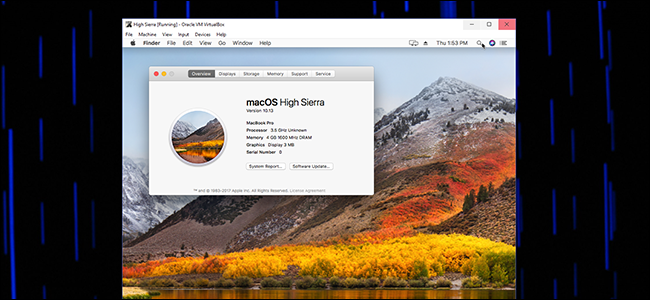
- #MAC OS FOR VIRTUALBOX VBR HOW TO#
- #MAC OS FOR VIRTUALBOX VBR INSTALL#
- #MAC OS FOR VIRTUALBOX VBR ISO#
- #MAC OS FOR VIRTUALBOX VBR DOWNLOAD#
- #MAC OS FOR VIRTUALBOX VBR MAC#
A general rule of thumb is that if you can spare it, supply more RAM to your virtual machine. You’ll want to provide at least 4GB to your macOS, or 4096MB to be precise. VirtualBox requires a minimum of 4GB or RAM to run, but the more the better. When you come up to the RAM setting, you’ll want to be generous. You’ll then be proceeding through all of the settings.

But if it’s not, you can just choose the settings I listed above and they should work fine.
#MAC OS FOR VIRTUALBOX VBR INSTALL#
Pay attention when selecting the version because you may find that High Sierra is offered as a version when you go to install it. You’ll want to have the following parameters selected or entered before clicking Next. You’ll want to create a virtual machine, and this is really easy.
#MAC OS FOR VIRTUALBOX VBR MAC#
Creating a mac Virtual Machine on Windows This file will be mounted in your virtual machine later on in the article, so it’s very important that this step is completed successfully. The next step is to copy the file over to your Windows machine (using a large USB drive seems to work best).
#MAC OS FOR VIRTUALBOX VBR ISO#
You’ve successfully created your own ISO file so that you can bootup your macOS. You need this extension to read “.iso” for it to work properly. Go to your desktop and rename the file, removing the “.cdr” extension.
#MAC OS FOR VIRTUALBOX VBR DOWNLOAD#
You’ll be able to download VirtualBox from the official website. If your computer doesn’t meet these requirements, you won’t be able to run macOS properly. Your computer will need to meet these minimum requirements: Note: You’ll need a decent computer to be able to run Virtual Box.

You’ll want to search for your desired operating system (we’ll be using High Sierra), and Download it.
#MAC OS FOR VIRTUALBOX VBR HOW TO#
Instead, borrow a Mac from a friend, or use your own and download the High Sierra OS from the App Store.Ĭheck out our high sierra installation guide for hackintosh Everything You Need to Get Started with Installing macOS on VirtualBoxīefore we go through the steps on how to install macOS on Virtual Box, let’s get everything together that you’ll need to get started. You might be able to find some distributions of the High Sierra ISO online, but there is always a risk when downloading from an unofficial source. I also recommend that you have access to a real Mac. That’s really not an issue because you’ll still be able to access all of your apps and software. Note: A lot of people will be able to get a mac virtual machine one Windows running smoothly, but sound doesn’t seem to work well. New to hackintosh? Learn more about it in our what is hackintosh? overview. All of that is changing, and Virtual Box is responsible for it and the rise of the Hackintosh. It’s the freedom that computer users have enjoyed with Linux and other operating systems.īut Apple has made it difficult to install their operating system on anything other than their own hardware. But with virtual box, you actually have macOS on a Windows PC.

The directory has to exist or launchd will just silently fail.Windows, macOS – which one do you want to use today? On a traditional setup, you’re stuck with one or the other. Third, the StandardErrorPath and StandardOutPath keys. This has to be pointing at your home directory. It turns out VBoxHeadless is not very smart about where it looks for VMs. Second important thing is the WorkingDirectory key. If you were to take the VBoxHeadless command from before, split it on spaces, and then each space gets it's own element. First, notice how the ProgramArguments list is broken out. There are a few important things to note about this configuration.

KeepAlive Label bugsplat.examplevm ProgramArguments VBoxHeadless -s examplevm RunAtLoad UserName peter WorkingDirectory /Users/peter StandardErrorPath /usr/local/var/log/examplevm.log StandardOutPath /usr/local/var/log/examplevm.log


 0 kommentar(er)
0 kommentar(er)
